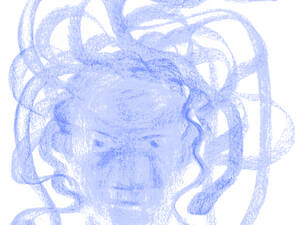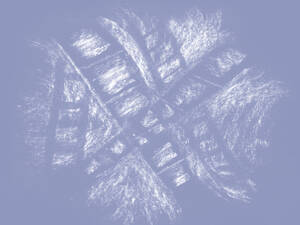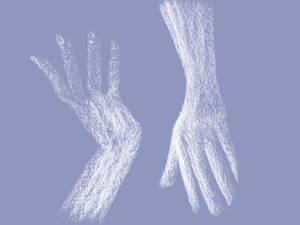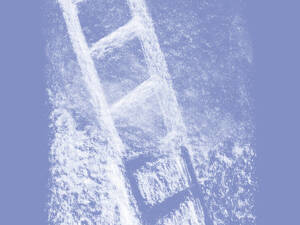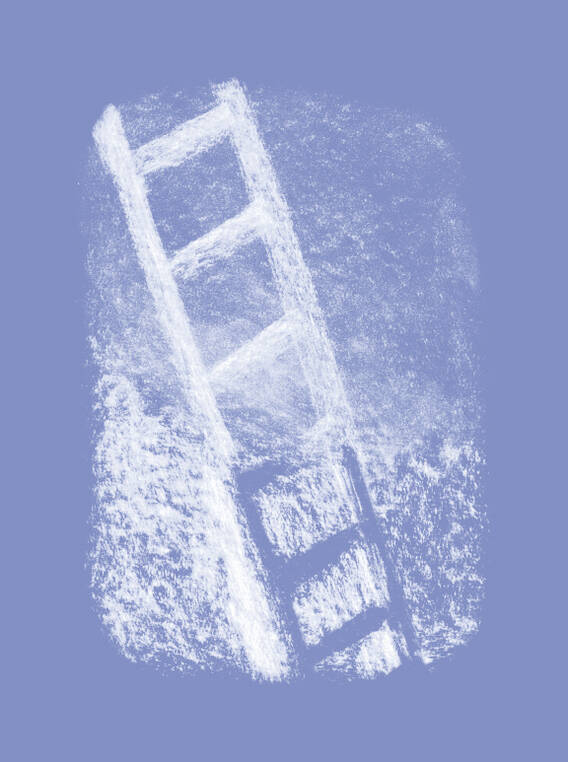
This article is part of a folio on Hélène Cixous. Click here to read the rest of the folio.
I loved above all literature ever since the death of my father my being had a definition of quite extraordinary precision that kept me and it from anything that was not literature, now this is the life I thought at dawn I would crack open a book by Stendhal and ‘‘the light’’ darted out; ‘‘the light’’ is this sudden, colorless switching on, all inner fire which, in principle, takes place whenever I get close to a sheet of paper book or notebook page, providing the condition of solitude is fulfilled. I open a book, the light is, right away the tongue begins its tale, I’m forever remaking myself with these literary molecules I told myself, then as now, it is six o’clock in the morning maybe seven, I hear the regular and strangely powerful breathing of the books on my shelves. Since the death of my father, they’ve been breathing like human cats. I was writing a thesis on the note-of-banishment-in-Shakespeare. Thirty-five years ago banishment was unable to play its poignant music except in Shakespeare. I did whatever I liked. I lived where I wanted to. In Stratford, in London, in Illyria, elsewhere. The note of banishment filled my thoughts with the enchanted music of mourning. Who cared about the rest of the world? I had reading for all time. I had left Paris and its Schools, where they didn’t want you says my mother because you were a young divorcee, a pity, says my mother not at all I say luckily they wouldn’t have me in the Schools, luckily even before I got in I was banished but right away, in return, I banished Paris, the Schools, in Paris I’d have had to bend my thinking and it would have bounced right back up and smashed everything. Right after my son George’s disappearance I took to the roads of literature I kept my distance from cities and schools, and I left to study the theme of banishment, whose music had a familiar ring, in manuscripts conserved in the usa thus safely banished by a process of paradoxical safekeeping. Passionately and reverently, off I went to consult the manuscripts, the radiant remains of the-to-my-eyes holy works, which the Europe of Schools would have none of whereas the voracious American Libraries had clearly longed for these relics fortunately collected and kept on the far shores of banishment where, later on, from the places that had seen the birth of these grains of light you crossed countries and oceans to go and share the miraculous bitterness of the experience of passovering that never ceases to repeat itself, again and again throughout time. I also went to consult the manuscripts of Ulysses and of Finnegans Wake in their mad diaspora, with tears in my eyes, I was indignant even as I rejoiced at the blind behavior that brings the political organism and the individual organism together. Either the body (political, individual, cultural) is good-natured about its most precious organs, its poets, its artists, its eyes, its dreams, or it is not and it begins to bomb and chase away its kings, its queens, its prophets, till they are fed up, never is it the least bit grateful for the apples of its own eyes.
I’m forever remaking myself with these literary molecules.
Feverishly I went after banishment, why did I bore myself to death in schools I tell my brother when I arrived from Africa, on the run, finally I’d escaped Algeria which didn’t want me till I no longer wanted Algeria either. I am observing our childhood from the balcony of this house says my brother and I see that you have never ceased chasing after the trace of banishment, look at this house, I would die of boredom here, you have shut yourself up in the outskirts of a city awful to behold in which you never set foot, I see that in the end you have banished yourself to a building that’s a lot like a paperback book.
—If I’d left Algeria and our childhood of regret and powerlessness it wasn’t so I could end up in France, I took the boat as soon as I could in my life so as to put some distance between me and one shore (and not to get to the other shore the very idea of reaching the other shore horrifies me, I never wanted the other shore except lost in advance, except vanishing, as disquieting and fascinating as it was desirable and repellent just like the dream shores of Lake Averno in which the unreal landscape with its veil of sulfurous fumes is merely the hint of imaginary countries) for once and for all I took a ticket for getting away from, not for getting close to and at this I was a big success, the getting away I got it and I never again lost it on a boat I had no port of arrival in view even when I took the giant boat for the usa it certainly wasn’t for the usa but for the Library thus secretly for my home base at no permanent address where those whose gift is for banishment are wholly embraced and taken in, the idea of banishment being respected there without being capitalized on, there is no professional banishment, nor is there any enrichment, only a tent roof over the campsite. In the usa I didn’t go from city to city but from one Library to the next, and even from one manuscript collection to the next. In my mind I took the boat that was moored between the columns of the British Museum for the monumental Beinecke Library, even if in reality I had to cross cities roads ports oceans ports cities airports roads that went from Paris to London to New York to New Haven to Buffalo. I wasn’t about to be separated from the theme of my complicated but meticulously organized trip: I went straight for literature as banishment. I wanted to interview the giants. All I wanted was to spend my life with the giants, no one else only the giants with giant works. I didn’t know myself at all and I didn’t interest me. I simply loved Literature as Higher Monstrosity. I enthused over corpses changed into pearls Full fathom five thy father lies, those are pearls that were his eyes over and over I repeated the magic words and nothing bad could happen. Literature changed the corpse of my father that was all I asked: the sublimation of the corpse I tell my brother is what I was looking for.
For me literature has always been the greatest and most sublime of affairs.
I got over the terrible suffering of the cemetery that we shared with a book I say to my brother. I never went back to the cemetery. I would read. I went right past the body on into sentences. I made sentences of my father. I wasn’t losing papa any more I say. I wasn’t losing any more. I had found the pearl mine. Whoever finds pearls finds pigs as well said my mother, but the pigs I put down to her taste for proverbs. I was possessed: I didn’t know it. It never crossed my mind I was losing in another way: I was on the brink of perdition. I didn’t see that I didn’t see myself. I was losing losing and so high up on the shelves of clouds that I had no alarm system, conscience, presentiment. I was adrift in change. I would read. Everything that could be done with a book in hand I did. Scarcely had I given birth, quick, Montaigne, I would laugh to see the new face of my son, the other one the one after, I no longer thought about the one before, I went on, no turning back, on and on I read and no nostalgia no sooner born than he too is future reader of my Montaigne who had already read and sketched his newborn portrait foresaying everything the speech of the hands as of the head, and the eyebrows and the shoulders there is no movement that doesn’t speak Montaigne I told my newborn son. And there is no creature I read to my infant whom Nature has not provided with everything he needs to survive: shells husks bark hair wool leather underfur feathers scales fleece silk claws teeth horns weapons clothing and just as the elephant grinds and sharpens the teeth it uses in war (having some special ones it keeps for this purpose and never puts to any other use), so to strengthen its mind and body the child has his stock of books. There are books for war and books for peace, books to complain with, others to rejoice, books to call to one another for help, books that bid us to love. Whatever I couldn’t do with a book I did fast, without leaving the beloved in my thoughts, and as soon as the child was bathed and dressed, I would go back to my book I laughed at its wit. I couldn’t not laugh. For me literature has always been the greatest and most sublime of affairs the only one that makes me laugh in the midst of the torment.
—Why was I bored to death during my eight years of medical school my brother exclaimed I’m going to tell you, it’s because I wasn’t doing what I wanted to be doing. It wasn’t my studies I was studying medicine in place of a dead man who loved doing what I hated and I couldn’t even clearly hate what I hated since being a stand-in for a dead man
I was a dead man’s suffering.
I too feared betraying an almighty-other (hence as most free people abandon their lives and beings to another-power, some of them even going so far as to make themselves stay at the side of this other power, because of its foreignness and the way in which it vaguely recalls some vanished power, in life as in death).
You never know whom you obey when you act imperiously against your own will.
Hélène Cixous is the founder of the first women’s studies program in France, at the University of Paris VIII. She is the author of more than 80 books, including plays, fiction, criticism, memoir, and poetry.
Beverley Bie Brahic lives in Paris. She is the translator of Hélène Cixous’s Portrait of Jacques Derrida as a Young Jewish Saint; Dream I Tell You; Reveries of the Wild Woman; and The Day I Wasn’t There, and the author of a volume of poems, Against Gravity.

